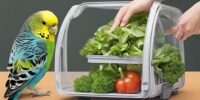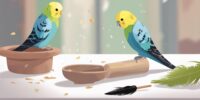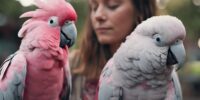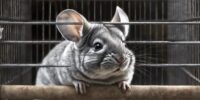When to Choose a Pionus Parrot for a Quieter Home

Pionus Parrots are known for their beautiful plumage, with shades of blue, green, and purple that make them a stunning addition to any household.
Their calm and easy-going demeanor also makes them a popular choice for families with children, as they are less likely to become stressed or agitated in a busy household.
Overall, Pionus Parrots are a wonderful option for those looking for a low-maintenance yet rewarding pet bird.
Pionus Parrots: An Overview
Pionus parrots, known for their gentle demeanor and vibrant plumage, are a popular choice among bird enthusiasts seeking a quieter companion. When it comes to their diet requirements, Pionus parrots thrive on a diverse diet consisting of high-quality pellets, fresh fruits, and vegetables. It's essential to provide a balanced diet to ensure their overall health and well-being. Additionally, offering occasional treats like nuts or seeds can be a good way to provide enrichment and variety.
In terms of breeding habits, Pionus parrots are known to be monogamous, forming strong pair bonds with their mates. They typically breed once a year, with the female laying a clutch of eggs in a suitable nesting site within the enclosure. It's important to provide a safe and comfortable environment for breeding pairs, ensuring they've privacy and adequate nesting materials. Breeders should also be prepared to provide proper care for the chicks once they hatch, as Pionus parrots are attentive parents.
Noise Level and Vocalizations
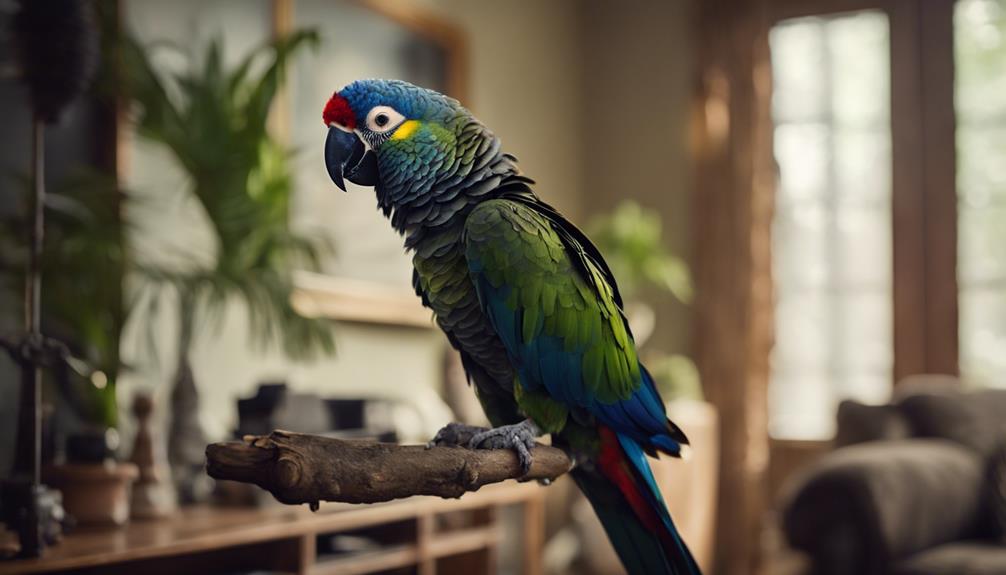
When considering a Pionus parrot as a pet, it's important to understand their noise level and vocalizations. Pionus parrots are known for their moderate noise levels compared to other parrot species. Noise management and training play a crucial role in controlling their vocalizations.
To help with vocalization control, providing a suitable environment is essential. Creating a quiet and calm space can help minimize excessive vocalizations. Additionally, engaging the parrot in interactive activities and providing sufficient mental stimulation can help prevent boredom-related vocalizations.
Training sessions focused on positive reinforcement can also aid in vocalization control. Rewarding desired behaviors while ignoring or redirecting unwanted vocalizations can be effective in shaping the parrot's behavior.
Understanding the natural vocalization patterns of Pionus parrots and responding appropriately can contribute to a harmonious living environment. With proper noise management strategies and vocalization control techniques, Pionus parrots can make excellent companions for those seeking a quieter pet bird.
Temperament and Behavior Traits
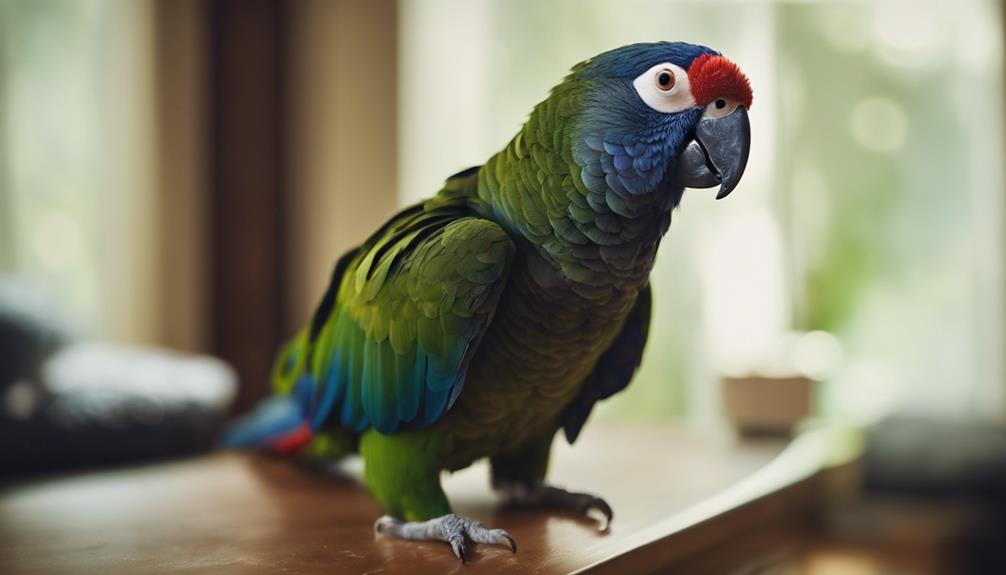
Understanding the temperament and behavior traits of Pionus parrots is essential for prospective owners to ensure a harmonious relationship with their avian companions. These parrots are known for their gentle and docile nature, making them delightful pets for those seeking a calmer avian companion. Additionally, Pionus parrots exhibit distinct personality differences, with some being more outgoing and social while others may lean towards being reserved and cautious. It's important for potential owners to spend time with different Pionus parrots to find one whose personality aligns with their lifestyle and preferences.
When it comes to training, Pionus parrots respond well to vocalization training. With patience and consistency, owners can teach these intelligent birds to mimic words and sounds. This training not only provides mental stimulation for the parrot but also strengthens the bond between the bird and its owner. By understanding the temperament and behavior traits of Pionus parrots, individuals can make an informed decision about whether these birds are the right fit for their home.
Suitable Living Environment
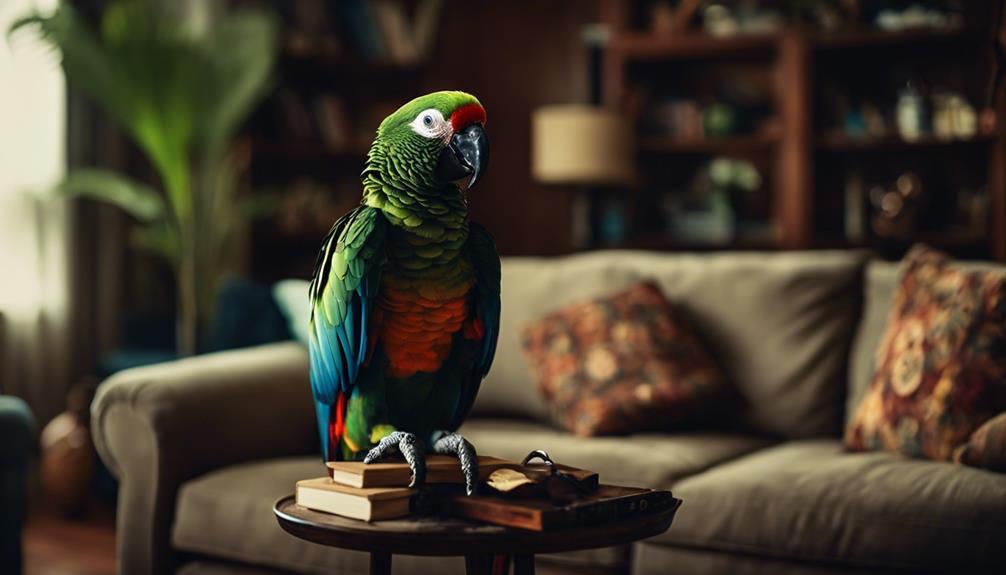
For optimal well-being, a suitable living environment plays a crucial role in ensuring the health and happiness of a Pionus parrot. When considering a Pionus parrot as a pet, it's essential to be mindful of their noise tolerance. Pionus parrots are known for their quieter nature compared to other parrot species, making them suitable for homes where excessive noise may be a concern. However, they still vocalize and can be chatty at times, so providing a calm and peaceful environment is beneficial for their well-being.
In terms of habitat setup, Pionus parrots thrive in spacious cages that allow them to move freely and stretch their wings. The cage should be equipped with perches of varying sizes and textures to promote foot health and exercise. Additionally, providing toys and mental stimulation is crucial to prevent boredom and encourage natural behaviors. Ensuring access to fresh food, water, and regular cleaning of the cage are also vital aspects of creating a suitable living environment for a Pionus parrot. By meeting their noise tolerance needs and setting up an enriching habitat, you can help your Pionus parrot lead a happy and healthy life.
Interaction and Socialization Needs
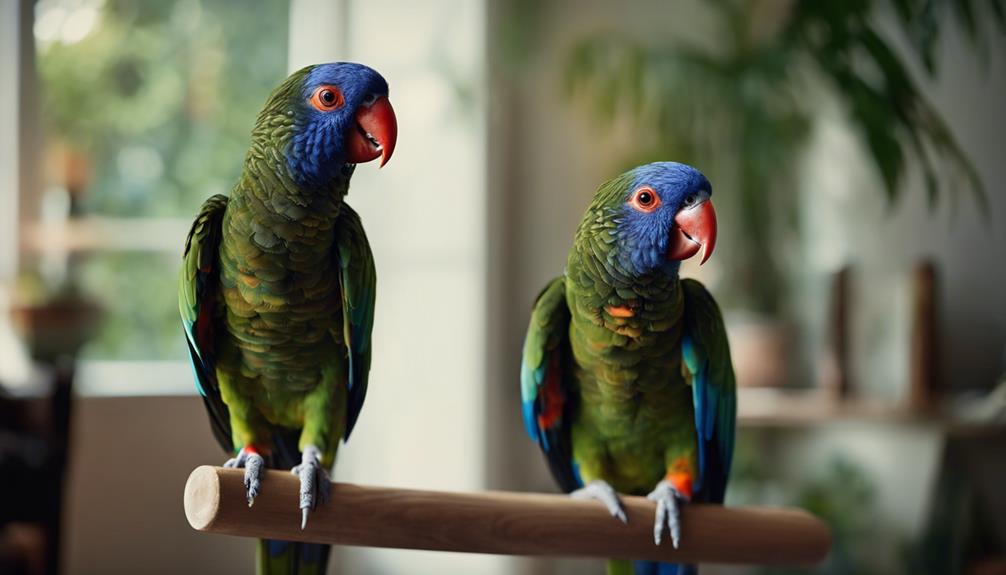
Creating a stimulating social environment is essential for meeting the interaction and socialization needs of a Pionus parrot. These birds thrive on companionship and require regular interaction to stay happy and healthy. Here are some key points to consider when addressing the interaction and socialization needs of a Pionus parrot:
- Socialization Requirements: Pionus parrots need daily socialization to prevent loneliness and boredom. They enjoy being part of a family and shouldn't be left alone for extended periods.
- Companionship Needs: Pionus parrots bond closely with their human caregivers and need a significant amount of attention to feel secure and content.
- Interaction Frequency: Regular, consistent interaction is crucial for Pionus parrots. Aim for spending several hours each day engaging with your feathered friend.
- Bonding Opportunities: Create opportunities for bonding through activities like training sessions, playtime, and gentle handling. These interactions strengthen the bond between you and your Pionus parrot, enhancing their overall well-being.
Training and Enrichment Activities
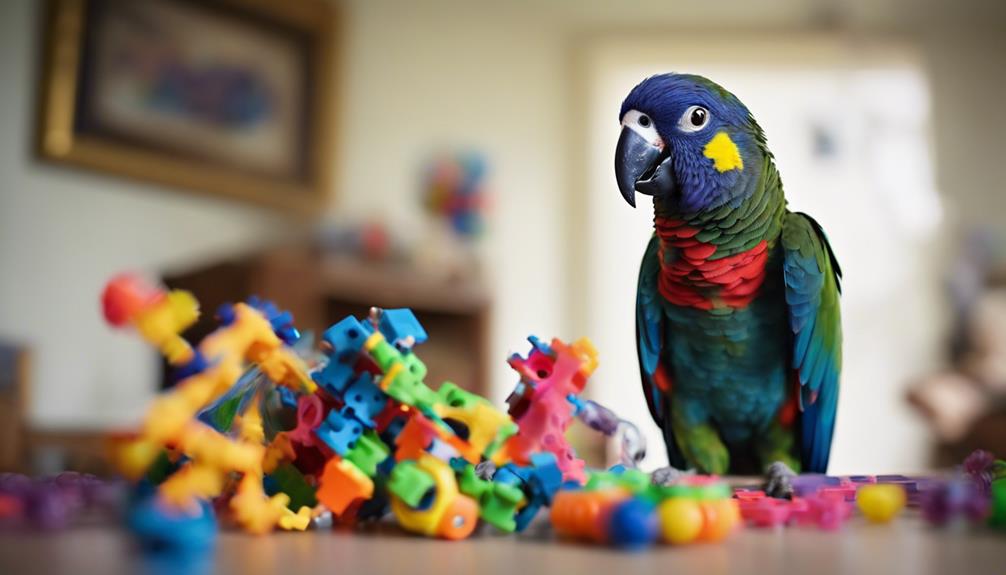
To ensure the overall well-being and mental stimulation of a Pionus parrot, engaging in regular training and enrichment activities is essential. Enrichment challenges are a great way to keep your Pionus parrot mentally engaged and prevent boredom. These challenges can include puzzle feeders, foraging toys, or rotating toys to maintain novelty. Behavioral training is also crucial for fostering a positive relationship with your parrot. Through positive reinforcement techniques, you can teach your Pionus parrot new tricks, commands, or behaviors.
Mental stimulation is key to a happy and healthy Pionus parrot. Interactive playtime is a fantastic way to provide mental enrichment. Spend time playing with your parrot using toys that encourage physical activity and problem-solving. This not only strengthens your bond but also keeps your parrot mentally sharp. Regular training sessions and interactive play will help prevent behavioral issues that can arise from boredom or lack of mental stimulation. By incorporating these activities into your daily routine, you can ensure your Pionus parrot thrives both mentally and physically.
Health Considerations and Maintenance
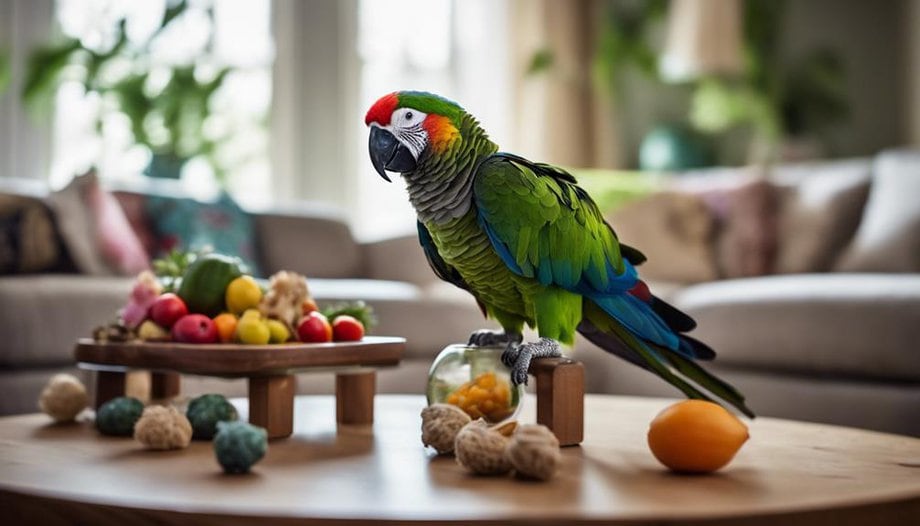
Ensuring the health and maintenance of your Pionus parrot requires a proactive approach to monitoring their diet, environment, and overall well-being.
- Dietary Needs: Provide a balanced diet consisting of high-quality pellets, fresh fruits, and vegetables. Avoid avocado, chocolate, caffeine, and high-fat or high-sugar treats.
- Grooming Habits: Trim your Pionus parrot's nails regularly to prevent overgrowth and potential injuries. Monitor their feathers for signs of damage or molting irregularities.
- Regular Veterinary Check-ups: Schedule annual check-ups with an avian veterinarian to ensure your parrot's health and address any issues promptly.
- Environmental Considerations: Maintain a clean and spacious living environment for your Pionus parrot. Ensure proper ventilation, temperature control, and access to natural light.
Frequently Asked Questions
Can Pionus Parrots Be Trained to Speak or Mimic Sounds Like Other Parrot Species?
Pionus parrots can be trained to speak and mimic sounds like other parrot species. Training techniques focus on repetition and positive reinforcement to develop their talking ability and enhance their vocal skills effectively.
Are Pionus Parrots Prone to Any Specific Health Issues That Potential Owners Should Be Aware Of?
Pionus parrots may encounter common illnesses like respiratory infections or feather plucking. Preventative care includes regular vet check-ups and a balanced diet. Behavior modification and socialization techniques can help address any issues that arise.
How Do Pionus Parrots Typically Interact With Other Pets in the Household?
Pionus parrots can be compatible with other pets when introduced gradually and supervised. Their calm demeanor makes them less likely to provoke conflicts. Consistent behavioral training for all pets can help create a harmonious household.
Do Pionus Parrots Require a Specific Type of Diet or Nutritional Supplements to Stay Healthy?
Pionus parrots need a balanced diet to stay healthy, including fresh fruits, vegetables, and high-quality pellets. Supplements like calcium may be necessary. Understanding their feeding habits is crucial for maintaining their well-being and overall health.
Are There Any Specific Grooming Requirements for Pionus Parrots, Such as Nail Trimming or Feather Care?
When caring for Pionus parrots, it's essential to provide proper grooming. Regular nail trimming is necessary to prevent overgrowth and potential injuries. Feather care involves ensuring a balanced diet for healthy feather growth and occasional baths for cleanliness.

